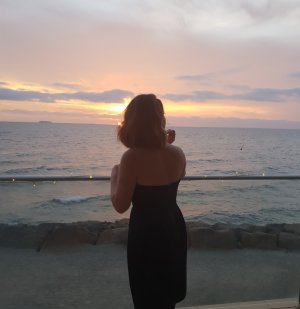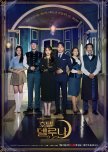
The snoozefest I didn't see coming
Hotel Del Luna (HDL) was an extremely hyped up drama when it came out in 2019 and I thought the title was appealing in the sense that it really evoked fantasy cinematic vibes. Having briefly looked at the premise however, it reminded me a bit too much of the 2013 drama, The Master's Sun (TMS). Despite being a human, the leading lady in that latter named drama also had this exceptionally rare capability of being able to see and communicate with spirits; thereby being an exact replica of Gu Chan-sung's (GCS) character here in HDL.Now it's also important to keep in mind that these kinds of themes/ideas are unique to a specific writer(s) for a drama, and so as it turned out, it was none other than the Hong Sisters who wrote the scripts for both HDL TMS. So, in that respect, perhaps one of the many reasons why I didn't enjoy HDL as much was because I found myself re-watching a drama which had almost the same plot focus as its predecessor. Having said that, HDL was just not hype-worthy sorry to say, but what I will say is that it was exceptional in many other aspects other than its storyline.
Firstly, I commend the people in the costume department for providing such an exquisite array of outfits for Jang Man-wol (JMW). I've never seen anything quite like it before to be honest, whereby the female lead had about ten different outfits, hairstyles, and accessories per episode which in many ways, was all thanks to her character's impeccable taste in fashion. Secondly, the production was quite amazing needless to say; I could not fault one episode which did not scream "attention to detail". In particular, I was in awe of the grand magnificence, size and classiness of the hotel.
However, was this enough to save the storyline?
Characters
If I can recall correctly, there were about six deities in total which starred in HDL (i.e. rich, poor, life, death, health, and love). Each served a different purpose, but it was mainly just one which really contributed to JMW's existence (save for the rest which had more involvement with GCS's character).
In terms of JMW's character, I thought there were some aspects of her which painted her to be quite headstrong, but also many others where she came across as needy and short-tempered; thereby making her seem like a damsel-in-distress and very unlikeable. But just some further examples. First, thriving off money and luxurious purchases to be able to live is not a new concept in the K-drama world - without this materialistic aspect, JMW would be nothing she says. Second, JMW's elegant fashion sense and mesmerising beauty no doubt won the heart of many viewers, but that alone could not save her character's god-awful temperament.
GCS's character was well... I'm not sure? I love Yeo Jin-goo, but his character I felt was more like a supporting cast type of role rather than a breaking male-lead kind. The characters around him were so twisted yet he treated them all nicely only to become their sacrificial lamb. Not to mention, why him? All of JMW's previous human managers could have been given the same responsibilities and duties as GCS thereby speeding up her process of heading to the afterlife by helping resolve the wishes of her hotel berieved guests. Sure, I get her past managers weren't all men, or as young, handsome and savvy like GCS, but at least they were humans who were emotionally present and could have helped her realise her mistakes sooner if Mago planted that moon flower inside any one of them.
As for Mago and the five other Mago's - why are there so many is my question? I understand the purpose of each one, but I found the whole premise of having a "deity" to be extremely convoluted and random by the end. The deity of health and wellbeing for example - I mean, what does she do with all the other medicines she makes apart from the flower-based drink JMW eventually drinks? Deity of wealth - extremely random and unnecessary given she appeared for less than 5 minutes to give JMW advice and then poof into thin air.
Storyline
Well, this one was just lacking in all aspects. I understand JMW spent 1,000 years living to right her wrongs but why did it take that long when another human could have landed the scapegoat role within that time?
Not to mention, there is no plot hole - the plot is simply finding out what murder she committed (which was hardly a surprise by the end) and then being freed from the chains of the tree which tied her down initially. When I read the plot analysis and saw the sentence "for a crime she committed but could not remember", I just thought well, what crime could be worse than murder itself? It's pretty self-explanatory isn't it? But the most predictable was her finding out the crime and then being sent to the afterlife before coming back as herself (I think it was) at the very end.
Come to think of it, the only plot holes were that of the ghosts - why did they die? How did they die? What were the circumstances surrounding their death? In many ways, they weren't all that interesting considering most didn't even talk and had to keep leading GCS on a chase/mission to help them get to the afterlife. That said, their sidestories were more powerful than JMW's.
Also as we are all aware, what is a drama without a plotting romance between the two leads? Sadly, and much to my dismay, I felt absolutely zero connection between JMW and GCS. Whilst you could see that GCS cared deeply for JMW, and JMW very subtly did the same, there was no romance to simply put it. For there to be romance, you have to feel it - the intensity, the chemistry and the pain in the eyes and portrayal of emotions.
Other comments
Unfortunately, the camera compositions and flashbacks became very tedious to look at. The tree, the entrance, the grand hotel foyer, and hallways, etc. - each setting/backdrop did very little to present new ideas and was more or less the same each time. For example, the significance of the Moon Tree was that it claimed JMW's immortality and in many ways served as a powerful symbol of growth, death, and rebirth. Yet, a lot of the time was dedicated to the protagonists standing in front of it trying to pull out any emotions you would have developed towards them and sure, you may feel some sympathy towards JMW, but not me. Similarly, the hotel served as a safe haven for lost/restless souls who were unable to move onto the afterlife but by the end, its purpose was made redundant when it disappeared after JMW's ties with the Moon Tree severed.
Finally, the flashbacks were repetitive and didn't add any excitement to the drama. While I understand each flashback served as a memory/indicator of the people JMW was surrounded by, including the events leading up to JMW's vengeance, they did very little to contribute to her character growth. In the present, she remained just as arrogant, uptight and vain as she was/did in the past and that made it all the more difficult for me to feel any sympathy for her. If anything, I thought JMW's ties to the hotel and Moon Tree served her just right, and felt way more pity for GCS who was chosen to be her sacrificial lamb.
Cet avis était-il utile?

PSJ was the reason for the success of this drama
PSJ was the reason for the success of this drama. You could put a bunch of actors in a room, but no one would have been able to portray his character (Park Saeroyi) like PSJ did himself. This drama was released at a time when Crash Landing on You (CLOY) was becoming one of the highest-rated shows of all times, and whilst this didn't quite compare to CLOY, it did however peak my interest in other ways. For example, the supporting cast involved characters from all different walks of life and is a good affirmation of that saying: "never judge a book by its cover". It highlighted discrimination, gender issues, corporate power/greed, and perserverance very well. There were some scenes which were a bit lacking and the chemistry b/w the lead actors could have been stronger, but overall this drama was well written and directed.Storyline -- started off great but then overly exaggerated towards the end with unncessary back and forth revenge acts, and in particular, Jo Yi-seo's character who was just annoying, irritating and difficult to watch.
Acting -- great execution and compelling performances by Park Seo-joon in his portrayal as Park Saeroyi, and from Yoo Jae-myung who played Jang Dae-hee (CEO of Jangga Pub).
Characters -- I loved that each character came from all different walks of life and was determined to put up a fight regardless of societal standards and values.
OST -- wasn't that big of a fan of the (pop rock) OST to be honest but maybe just a few song selections here and there.
Cet avis était-il utile?
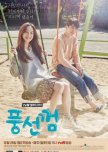
The only tears I shed were from yawning
I’ll admit that I didn’t have high hopes for this drama, so I wasn’t the least surprised when I got to the end and felt completely and utterly deflated. Bubble Gum is just another case of two childhood friends turned workaholics who end up falling for one another, and everything is pretty much an eyeroll from thereon. Storylines like this can either be such a hit or miss depending on how it’s executed, and I don’t mean in terms of how it’s directed or produced, but whether there is an exhilarating character or plot development – both of which were absent throughout the whole 16 episodes.Looking back, Park Ri-hwan (Lee Dong-wook) and Kim Haeng-ah (Jung Ryeo-won) were meant to be these two very easy-going and likeable leads who were successful in their respective fields, private, low-key, and no-drama kinds of people. Yet somehow, these characteristics also happened to be their biggest downfall because they turned into these boring, uncharismatic, and passive puppet protagonists who never took it upon themselves to reel the story forward. Rather, the driving force ended up being the supporting characters, each of whom made you want to claw your eyes out. They were frustrating, annoying, and unbearable to watch for the opposite reason given above in describing Ri-hwan and Haeng-ah’s character traits. A few examples include but are not limited to the stereotypical rich mum or tiger mum, overbearing best friend, irritating or desperate second female lead AND male lead, and pushy/cringey ancillary characters who contributed nothing to the plot.
To make matters worse, the second female lead (Hong Yi-seul) was portrayed as this academically intelligent woman turned hopeless romantic caught up in a one-sided love. The woman was just clingy, relentless, and increasingly petty when it came to wanting to get Ri-hwan’s undivided attention, and understandable that one would get jealous upon hearing from her arranged suitor (Ri-hwan) in person that he was in love with his best friend, but nothing changed for this was not breaking news, and it was pretty clear from the first episode that Ri-hwan had absolutely zero interest in pursuing her but just stuck around to be the nice guy he was.
Similarly, Haeng-ah’s ex-boyfriend, Kang Suk-joon (second male lead) was just as infuriating to watch as Yi-seul. His character was stubborn, arrogant, and desperate, and not one bit of me felt sorry for him each time he tried to convince Haeng-ah into giving him a second chance but was instead turned down. Although he wasn’t a toxic or malicious person per se, his presence inhibited Haeng-ah’s growth in the drama and there was just no second male lead syndrome to simply put.
Perhaps the most annoying character though was Ri-hwan’s mother, Park Sun-young, who was controlling and slightly calculating. If she had accepted that Ri-hwan and Haeng-ah were meant to be together from the start, then she wouldn’t have had to make things so difficult for herself and the couple from the get-go. But every decision she made was outright selfish even though she claimed it was for the best for the two adults.
Other annoying characters included Haeng-ah’s best friend and co-worker, Noh Tae-hee, who became increasingly intense, annoying, and controlling as each episode went by, as well as a radio host in her 40s, Oh Se-young, whose character just screamed 'baby'. Although I liked that Se-young’s character challenged the stigma surrounding big age-gap relationships, and Tae-hee made all these attempts to woo a divorced man at her workplace, both the females’ acting was just too over the top for my liking, and their characters’ struggles seemed to overshadow that of Ri-hwan’s and Haeng-ah’s.
I couldn’t also help but get frustrated as a viewer when Ri-hwan was confronted by Yi-seul’s older brother, Hong Jung-woo, during a heated scene. Involving overprotective chaebol siblings who use bribes to get what they want is such an overused cliché which dumbs down the plot. This is even more so the case when Jung-woo is so afraid of heartbreak getting to Yi-seul and says to Ri-hwan of words to the following effect: “I want my sister to marry the man she loves. More than that, I want her to marry someone who loves her. If you can't change to be that person... why don't you go somewhere where you will not be seen. For example, a place where neither I nor Yi-seul can suddenly appear like this.” … *EYEROLLS*
In the end, the dialogue was watered down by petty remarks and mundane rants about love and life which had little impact on the plot. Although I appreciated this drama helping shed light on a lot of the stigma surrounding mental health including taboo relationships prevalent in modern society, I thought both of these aspects could have been better developed into something that was less cringeworthy. On the flipside, I gave it some well-deserved stars for the chemistry between the leads, and the radio show setting which acted as a place of solace for people to call in and talk about their personal problems.
“To lose something and to forget something ... There's no way to be sad about those things... If the bubble pops, then you can just blow another one. The small happiness that you feel when chewing bubble-gum... It's not any different from any other kind of happiness.” – Ri-hwan
Cet avis était-il utile?

Very lacklustre
I'm a huge fan of sappy KDs, so it took me by surprise when this one didn't hit me quite in the spot. The acting from each cast member was flawless, but the storyline and lack of character development in the earlier episodes was such a wasted opportunity. I think I must've only been 4-6 episodes in when I sort of wanted to give up watching. It also didn't help that I found NJ's character to be extremely superficial and annoying. It brought back memories of IU's character in the 2015 drama "The Producer", who I can't say I also liked. Anyways, I think the point I wanted to make was that if you're willing to sit through hours watching two former flames bickering, making up, acting petty, finding themselves through the lens of each other, and living very mundane lifestyles, then this is your kind of KD. I totally get that the themes of this KD is young love, forgiveness, self-development and rekindling, but what use is it if everyone nearing the age of 30 in the KD is going through teenage angst, and the characters do nothing but feign ignorance most of the time?Cet avis était-il utile?
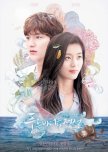
The Legend of the Blue Sea
2 personnes ont trouvé cette critique utile
Would have done better as a 90-minute historical motion picture for kids on Disney
If you're looking for a riveting and compelling storyline with gripping plot twists, then this drama is anything but. Like many other fantasy dramas, Legend of the Sea is a light-hearted rom-com which tells the love story of a girl and a boy (well in this case, a modern-day mermaid and a talented con-artist).Characters
Cheong Shim/Se-hwa (played by Jun Ji-hyun) was an absolute cracker of a character; her fearlessness, cheek, wackiness, and great sense of humour won many people's hearts throughout the entire series, including my own. Could the casting director have picked anyone more suitable to play Cheong Shim other than Ms Jun herself? Absolutely not. Jun has this very captivating gaze about her when it comes to rom-com roles, and not to mention, her ability to act funny is both natural and effortless. But insofar as Jun's capabilities go, I have yet to see her act in more serious roles other than in 'My Love from the Star', and this drama itself.
Heo Joon-jae/Dam-ryeong (played by Lee Min-ho) on the other hand was less captivating as the leading male protagonist. Lee Min-ho's prior roles included Gu Jun-pyo in BOF, Jeon Jin-ho in Personal Taste, Lee Yoon-seong in City Hunter, and Kim Tan in the Heirs, and here, it just felt as though he was reprising his prior roles by taking on the same, boring, old personas - cold, callous, egotistic, but also funny, flippant and a huge romantic at times.
The supporting actors weren't any better to be honest, despite the years of experience three quarters of the cast had prior to starring in this drama. Don't get me wrong, I've seen some fantastic acting from quite a handful of the cast members, but their acting here just made me cringe so much. That said, the only person which really stood out to me was Heo Chi-hyun's character (older step-brother of Heo Joon-jae). Unlike Joon-jae, Chi-hyun was a good kid who grew up to be a successful businessman following in his his step-father's footsteps. A rebellious youngJoon-jae was therefore no match for Chi-hyun, yet all Chi-hyun wanted in life was for them to be brothers before anything. Of course the storyline didn't allow for this to happen, but I'm thankful that at least the actor who played Chi-hyun did a fantastic job at it by keeping his character's emotions and performance in check.
Storyline
Despite Park Ji-eun having written the scripts for two of the most commercially successful dramas ((My Love from the Star (2013-14) and Crash Landing on You (2019-20)), this script just couldn't compare in any shape or form, and was more or less the same in terms of dullness as her scriptwriting in the Producers (2015).
Park is no doubt a talented writer, but her ability to develop a unique dialogue really hit a low here (but perhaps not lower than that of the Producers). Needless to say, the effectiveness of the dialogue was watered down by a lot of small talk which failed to capture the essence of crucial moments. The over-use of petty remarks, or fatuous lines which contributed nothing to the plot, or character development was well and truly disappointing.
It's not often I turn my attention away from something I'm watching, but this drama made me feel so drained to the point I had I to figure out what other ways I could still watch it but not give it my full, undivided attention. And that's when it clicked - why not just play this drama in the background when I was doing something else? A drama's dialogue should be engaging from start to finish, but if as a viewer, you feel more determined multi-tasking whilst watching a drama like this on the side, then that's sufficient to say that you've really lost touch with it.
There were also many times where the writer was pushing for suspense, but everything just came across far too easy, cheap and predictable. For suspense to be elicited, the scenes should be gripping and heart-pumping, but what good is it if the stunts and tactics are of a Tom & Jerry kind, but worst?
Come to think of it, this drama would have done better as a 90-minute historical motion picture for kids; Disney style. Instead of going through the 20 episodes to find out what happens (which is basically an overly the top fairy-tale ending between the two leads), this drama could have been easily condensed into a movie using all the Joseon period flashbacks. Se-hwa and Dam-ryeong's poignant love story was already far more compelling and moving than that of their modern-day reincarnations, so for what reason did it need to be dragged on and made into a series? Furthermore, the key themes of fate, tragedy and revenge were heavily centred upon, but very poorly executed.
A couple of scenes which demonstrated this:
1. There's an emergency situation and A's phone is ringing on a bedside table; however A is unaware of this and by the time A picks up their phone to see a missed call from B, it's already all too late;
2. B dies as a result of having their drink poisoned by C and an autopsy is carried out, yet police is still unable to figure out the circumstances of B's death;
3. C pretends to fake mourn over B's death at the mortuary and everyone somehow falls for it;
4. D jumps in front and takes bullet for A only to end up in hospital (mind you there were 10 police officers at the scene, yet D somehow ended up getting shot...).
But, if there two things which I have to give this drama credit for, it would be:
1. the very unlikely noona and dongsaeng romance between Tae-oh and Shi-ah which was far more intense than Shim Cheong and Joon-jae's; and
2. great staged hostage situation by Joon-jae and his sidekicks (reminded me a lot of Signal).
Other than that, one would have hoped that a drama starring an A-class ensemble would without a doubt trump a B-/C+ storyline, yet this could not be helped considering the direction, production and writing was just a big, sloppy mess from the get-go and there was nothing that could salvage it.
Cet avis était-il utile?
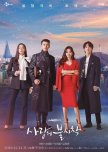
Crash Landing on You
1 personnes ont trouvé cette critique utile
A modern-day forbidden love story beautifully portrayed
For a KD to portray and pull off the North Korean culture and dialect deserves an award in itself. So many dramas fail to capture the depiction of North Korea in the positive sense of things, but this KD does everything in its power to show both the good and bad side of the country including the value of belonging in a community. The character development of both leads and supporting cast was also incredible to watch given no one outshone one another, and each character (whether their part was big or small) had an equal opportunity to tell their life story. Moreover, to unite the two Koreas by plotting a developing romance between two people with completely opposite lives and mantra was a genius idea. The energy and undeniable chemistry you felt from the screen b/w the two leads is honestly unmatched, and the fact that I cried in almost every episode goes to show how big of an impact most of the scenes had on me to feel the way I did.Cet avis était-il utile?
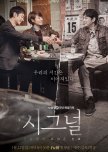
Heart-stopping from start to finish
I often have doubts about crime dramas due to alot of the unoriginal developments in storylines, but Signal could never. This was a drama that did NOT disappoint from start to finish - in fact, the heart-stopping end to every episode had me wanting more. The artistic camerawork, captivating nonlinear narrative, sophisticated direction, unique plot twists, compelling performance, highly-constructed alternate timelines, and last but not least, the suspense and anticipation was what made a drama like Signal worth watching. The drama was extremely unique and satisfying to watch in that it hinged on one specific object, and that object's ability to dictate the fates of the main characters, including every decision bound by it. Finally, the series also received widespread acclaim from audience and critics alike so what more can I say?However, there were some things which I felt could've been better explained at the end. For example, I couldn't quite grasp how that walkie-talkie ended up sending radio transmissions in the first place, and felt disappointed that those mere last 3 minutes didn't allow the audience to really get a taste of satisfaction (despite the great outcome being deduced). Extending to include just some couple more scenes to see everything tie in such as having Park Hae-young and Cha Soo-hyun appear at Lee Jae-han's hospital door (so I could finally exclaim with joy and satisfaction the words: "FINALLY/YES" would have really been the cherry on top.
Storyline -- original screenplay, highly engaging, well-developed script;
Cast (supporting included) -- remarkable performance by each actor's ability to convey emotions and thoughts through eyes and body language effortlessly;
OST -- adapted from old school melodies (ie. pre-2010 Korean OSTs) was an unconventional move, but at the same time, so fitting as it only gave the drama way more character and depth.
Cet avis était-il utile?
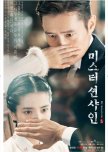
Name a more Oscar-worthy drama… I’ll wait
Upon a quick glance at the title and the promotional poster, you’re probably already thinking wow, this sure looks underwhelming! Well, dare I say that those were precisely my first thoughts – but now, I don’t even hesitate for one second when someone asks me whether this drama is any good, because my answer will always be the same, and that is: ‘exceptional’ doesn’t even begin to cut it.Initially, I thought the premise was very lacklustre – set in the early 1900s, this mini-series focuses on Righteous Army activists fighting for Korea’s independence against foreign forces, but the more I watched, the more I began to realise how fascinating this was. Not only did it act as a device to help viewers establish the rationale behind each of the character’s motives, but it also contributed to the story’s development in more ways than I could have imagined. The idea of a premise is that it lays down the most basic foundation of a writer’s work, and just like a movie post or an illustrated cover of a book, it paints a simple image of what’s inside, but not much more. And here’s the thing, it’s incredibly unfortunate to still see so many K-drama writers (whether old or new to screenwriting) fall into this rut when it comes to bringing an idea to life. However, for Mr. Sunshine screenwriter Kim Eun-sook, this doesn’t ever appear to be a problem she faces.
Kim is one of the most accomplished and sought after screenwriters in the industry, and it’s a no-brainer as to why this is the case. In the last 10 years, she has written the script for some of the most commercially successful dramas: Secret Garden (2010), A Gentleman’s Dignity (2012), The Heirs (2013), Descendants of the Sun (2016), Goblin (2016), The King (2020), and this drama included. Yes, she may have incorporated overused clichés in a few of her written work (e.g. rich guy-poor girl, evil mother-in-law, etc), but at the same time, it’s evident she continues to develop narratives which are so unique and enthralling; a talent which is unsurpassed in the industry. Unlike many writers whose dramas flopped, each one of her projects has stood the test of time, and this drama is no exception.
But the success of Mr. Sunshine ought to be shared equally with director Lee Eung-bok, whose creative direction and vast use of cinematic techniques in this drama was just out of this world. Together, they raised viewers’ awareness of Korea’s history, and shed light on those deemed peripheral in society. Many with very little understanding or are quick to judge will say that everything portrayed is historically inaccurate or rubbish, but what these people fail to acknowledge is that these very cruel and tragic events did happen, and whether or not this drama perfectly encapsulated that 101% accuracy is irrelevant. Mr. Sunshine was a cleverly crafted masterpiece to simply put, and I have no doubt the producer called in a historian to ensure the historical and factual basis of the premise was presented in such a way that had more to do with the storyline and character development, rather than the accuracy value it would have added to the plot.
The storyline was wonderfully perplexing, with each dramatic turn adding all these unexpected twists. It was fuelled with long-awaited revenges, political debacles, and palace shambles, all atop a crumbling social class system and a country’s disastrous attempt at stopping the Japanese from invading. Unlikely friendships formed, loyalties tested, identities challenged, and moral compasses questioned, but till the very end, not one person flinched, nor did they flee their allegiance to join another simply for the sake of love or friendship. But what I really appreciated about Mr. Sunshine would be this: the delivery of a poignant love story without the need for any kissing scenes.
I’m not going to lie when I say that there’s got to be smooching involved to make the chemistry somewhat convincing, but even when there was none of that here, I wasn’t the slightest bit concerned or disappointed. Because when there was grief, I ugly cried; when there was suspense, I went numb; when characters embraced, my heart melted; when a character experienced pain, I too felt my heart being ripped out of my chest; whenever a villain or antagonist appeared, my insides burned with rage; when a character showed their quirks, I chuckled with amusement; and last but not least, when a scene was so profoundly sad, it did more than just move me beyond tears.
I also admired Kim’s screenwriting, because instead of cheapening the plot with unnecessary exchanges, I found myself immersed in eloquent poetry and an engaging dialogue that actually built towards something, whether it was revealing important information about a course of action or disclosing a certain character’s disposition. And every time a flashback or sentimental object re-appeared, I knew what purpose it served because the story behind it was so powerful that it became an etched memory (e.g. Lady Yun’s norigae (ornament), ragged shoe floating in the well, wooden music box, red paper windmill, etc). The stunning cinematography was also something to marvel at; not just acting as a visual aid, but in creating this immersive historical experience. With a beautifully composed soundtrack to match, I was well and truly enchanted. (Two songs in particular which struck a chord was Park Hyo-shin’s “The Day”, and Baek Ji-young’s “See You Again”; both of which evoked so much soul, emotion, and lyrical meaning).
But what this drama could really not have done without was the outstanding performance of its talented cast (whether lead or supporting). The main cast comprising of Lee Byung-hun, Kim Tae-ri, Yoo Yeon-seok, Kim Min-jung and Byung Yo-han all had a unique charisma and stage presence about them, and I’m so thankful that their talents did not go to waste when they auditioned for their respective roles as Eugene Choi, Go Ae-shin, Gu Dong-mae, Kudo Hina and Kim Hui-seong. To be able to see each individual connect with their characters by immersing themselves in the script was one thing, but then the ability to translate and deliver the right amount of expressive energy and a certain personality on-screen was another. Thus, it was really pleasing to see that actor was emotionally, mentally, and physically invested in whatever challenges their character faced.
To start off, Lee Byung-hun did a marvellous job acting as Eugene Choi. His natural charm and ability to bring so much depth and emotion to the screen was very enthralling, and I couldn’t help but be captivated every time his character spoke, laughed, or smiled. Eugene was a man of chivalry and didn’t hesitate to rise and display authority whenever he was placed in a position of conflict. He was clever, ballsy, and uncompromising, but at the same time, considerate, sincere, and likeable because he always spoke his mind. Lee’s action scenes in particular just exuded this wow factor you’ll rarely see from other male leads; attributed to all the stunt, weapons, and martial arts training he had done in the past to be better prepared for his Hollywood action roles. Combined with his knack for being able to also speak English and Japanese fluently in the drama – you couldn’t help but think, what can’t this man do?! If anything, Lee is a true embodiment of fine wine that gets better with age.
Likewise, Kim Tae-ri absolutely killed it as Go Ae-shin, and who would have thought Mr. Sunshine would be her first breakout role on the small screen! What really stood out to me about Kim’s character was that she was such a badass, fierce, smart, and tenacious noblewoman who wasn’t unlike every other female lead, and it was only through her ability as an actress that she was able to deliver a strong and empowering female protagonist that was more than just a pretty face. Ae-shin was quite literally living proof of Mulan under disguise in a black suit, and the fact that she risked her life, nobility and feminity by switching out of a traditional hanbok and into clothing that placed her in a man's world to protect her country, and her country’s people was worthy of admiration. Simultaneously, Kim did a stunning job at portraying Ae-shin as this graceful aristocratic lady whose posture, speech, and movements were refined, articulate and well-paced.
But if there’s one person who I really want to commend for his acting, it would be Yoo Yeon-seok. This man’s performance was just incredible, and even if his character were barbaric and callous, you have to really give him credit for emulating someone like Gu Dong-mae. Dong-mae was the kind of character that gave you chills just by the way he smirked, tinkered with his samurai swords, or held a gaze, and that’s the sort of talent you want to invest your time in watching. That said, his character wasn’t all that coldblooded and indifferent. Eventually, we see that he wants to be a part of a society where people don’t fear him, and whenever we caught a glimpse of his softer side, it was often met with sorrow and sympathy. Yoo genuinely did an excellent job at his portrayal of Dong-mae not only as the loyal and merciless leader of Musin Society, but also as someone who was authentic and selfishly selfless.
It is also worth noting that Mr. Sunshine upped the ante to showcase the strength and power of women in characters like Kudo Hina/Lee Yang-hwa (Kim Min-jung). Although her role was secondary to that of Go Ae-shin, I really admired how Kim’s character was this affluent, elegant, cultured, and classy modern-day lady who was very ruthless at times. Her role as an accomplished owner of Glory Hotel not only allowed her to indulge in elaborate kimonos, Edwardian fashionwear, and an array of Victorian-era hairstyles, but it also gave her the opportunity to shine through as a skilled linguist, fencer, trendsetter, and businesswoman. It’s quite rare to come across a second female lead this alluring, and a multifaceted character at that, so needless to say that I was impressed by how Kim always exuded the right amount of charisma with the perfect expressions to match in her portrayal of Kudo Hina.
And then there's Kim Hui-seong (Byun Yo-han), the charming third male lead who plays the second wealthiest man after the King of Joseon. From his use of self-deprecating humour to enliven sticky situations, playful teases, and softly-spoken lines, to the way he showed true, genuine concern for those around him, Hui-seong was nothing quite like the condescending and smooth-talking Casanova aristocrat I thought he’d be. Byun showed the audience that his character was more than just a womaniser; he was a gentle soul, risk-taker and a free-spirit who really wanted to contribute to society. It also goes without saying that he is a natural when it comes to conveying the expressions of someone who is genuinely in love. Hui-seong’s gaze always dazzled with adoration for his fiancée, and he never hesitated to wear a tender smile which carried with it this sweet sadness.
Final comments
I have never been more impressed by an AMAZING supporting cast, and although I may not know everyone’s names, it is without a doubt that their acting has left a lasting impression on all viewers such as myself. Kim Eui-sung especially, did an incredible job acting as Lee Wan-ik (the drama’s primary villain) and it only just occurred to me that he played the evil businessman in ‘Train to Busan’. Honestly, this guy’s expertise must be in villainous roles because his character in Mr. Sunshine was hardcore wicked with no redeeming qualities, and the fact that he could make you hate his character’s guts on a level you’ve never felt before is a true testament to one’s acting capabilities.
Not only did Mr. Sunshine record the 6th highest rating for any given episode in cable television (previously coming in 3rd place before the release of Hotel del Luna [2019], Crash Landing on You [2019-20] and the World of the Married [2020]), but it also netted an overall average rating of 12.955%, making it the second highest-rated K-drama of all times in cable television. What makes this latter figure far more significant than the first is because not only does it reflect the popularity of the series during its broadcast, but it also evidences strong audience engagement.
There is no doubt that Mr. Sunshine is probably my most favourite drama to date (along with Crash Landing on You and Signal), but if you ever just need to know why again, please don't hesitate to re-read this review.
Favourite quotes
Kudo Hina: “Three men who are worse than strangers are gathered in one room.”
Ae-shin: “Not goodbye but see you again.”
Lee Wan-ik: “I may be a mutt or a hound, but I’m the boss of all other dogs.”
Ae-shin: “You only have one bullet”, Eugene: As always, I just need to use it wisely.”
Kudo Hina: “Before you leave, act like a decent father for once in your life.”
Dong-mae: “We, unlike our parents, can shoot a gun or drive a sword through anyone.” Eugene: “I made a choice. We, unlike our parents, have the luxury of making choices.”
Ae-shin: “Gun. Glory. Sad Ending.”
Character summaries
Eugene Choi/Choi Yu-Jin (Lee Byung-hun) is the son of slave parents who flees Joseon at a young age and becomes a naturalised American citizen. Growing up, Eugene knew he was different from all the other kids – from his skin colour, long hair to his poor English speaking abilities – getting heavily bullied as a result. From the point he realises that he can no longer live as a Joseon man in a western world, his growth is exponential, and Eugene defies all odds to end up becoming a very admirable U.S. Marine Corps officer. Despite his accomplishments, he continues to be tormented by his past memories of being hunted down by slave hunters and keeps hold of Lady Yun’s norigae (a traditional Korean accessory that is hung from a woman’s hanbok skirt) as a reminder of his mother’s sacrifices. But make no mistake when I say each flashback of Eugene being thrown that norigae by his mother came with profound sadness; a true testament to the saying that “a mother's love for her child is like nothing else in the world. It knows no law, no pity. It dares all things and crushes down remorselessly all that stands in its path." But that is not the only object which served a purpose in the story – Eugene also kept with him a very peculiar wooden music box, which played a hauntingly enchanting yet sorrowful melody. What made this music box so special was its significance to Eugene; the melody evoked happiness, hope, and life in spite of the tragedy and grief he suffered fleeing Joseon as a very young child.
Upon his return to Joseon, we see that Eugene’s unwavering loyalty to America remains unchanged when he is sent to the American Legation in Joseon to uphold peace and friendly relations between the two countries. Although he is often dragged into Joseon’s political debacles by Emperor Gwangmu (Lee Seung-joon) and anti-Japanese minister, Lee Jeong-moon (Kang Shin-il), Eugene explains that he has no intention to be swayed by their desperation to protect Joseon from Japan and all for a very good reason. At the same time, we learn that every action he makes is somehow unintentionally politically motivated – both a win for himself, and for the Emperor and his underlings; demonstrated by what he ends up doing with the ‘Certificate of Deposit’ (i.e. the King’s bank certificate), Minister of Foreign Affairs, Lee Se-hun, and his position at the Royal Military Academy where he shares with his trainees a very powerful Arabic proverb: “An army of sheep led by a lion would defeat an army of lion led by a sheep.” Although Eugene is seen to be this serious, calculating, and audacious character, I loved that he also had this warmer side to him which he shared with Go Ae-shin (Kim Tae-ri) – the Joseon woman he fell in love with and cherished more than his own life.
Unlike Eugene, Ae-shin was more reserved and careful with how she carried herself, and their love story was met with a lot of difficulties and uncertainties whenever a mission arose, or their situations changed, and neither of them would know the outcome of one another – symbolised by the placing of a red paper windmill at each other’s place of residence, or at the Apothecary (where they would often meet in secret). Although the portrayal of their relationship was far from the lovey-dovey type that you would otherwise normally expect to see in K-dramas, you could tell that their love for each other was nonetheless so pure, and every misty-eyed gaze and embrace became more heart-wrenching than the last.
The daughter of an aristocrat, Ae-shin was well-known for her kind heart; never faltering to help those she saw in need. As if brains and beauty was not enough, Ae-shin ended up following in her parents’ footsteps to become a part of the Righteous army, a movement led by her grandfather to protect Joseon people from threats instigated by Japan and foreign forces. Although she was refused involvement on many occasions by Lord Go, I loved that her persistence, grit, determination, and fearlessness to provide for Joseon and more trumped feminity and nobility, thereafter, becoming the army’s most-skilled sniper after her master, gunman Jang Seung-goo (Choi Moo-sung). If there was anything to admire about her character, it would be that she was a reticent catalyst for Joseon people’s freedoms and women's liberation – and who doesn’t love a strong, empowering female lead?
Cet avis était-il utile?
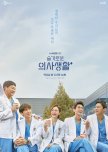
The slice-of-life drama I never knew I needed
There are so many things to love about this drama - from the soundtrack to the acting and the melt-in-the-heart moments. I find it really difficult to find a drama that's an "easy watch", especially as some days at work can get really stressful and all it takes is a drama like this to lift up my spirits. It highlights the struggles and joyous moments of each main character equally, but never ever lets either of those things drag on for too long. For example, in the episode after Ik-jun's wife wanted to divorce him, my gut feeling was that that would really impact upon his performance as a general surgeon, but that wasn't the case at all. Instead, those struggles were briefly captured when he opened up to a patient of his about being cheated on, thus allowing the patient to resonate with him.Cet avis était-il utile?

